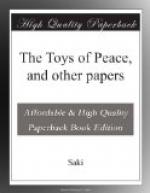“Unlock the door this instant,” he shouted, with as much air of menacing authority as a hen might assume when screaming through the bars of a coop at a marauding hawk. In reply to his summons the hall-door closed with a defiant bang.
A neighbouring clock struck the hour of midnight. If the cows had received the gift of human speech at that moment they would not have been able to make themselves heard. Seven or eight other voices were engaged in describing Bertie’s present conduct and his general character at a high pressure of excitement and indignation.
In the course of half an hour or so everything that it was permissible to say about Bertie had been said some dozens of times, and other topics began to come to the front—the extreme mustiness of the cow-house, the possibility of it catching fire, and the probability of it being a Rowton House for the vagrant rats of the neighbourhood. And still no sign of deliverance came to the unwilling vigil-keepers.
Towards one o’clock the sound of rather boisterous and undisciplined carol-singing approached rapidly, and came to a sudden anchorage, apparently just outside the garden-gate. A motor-load of youthful “bloods,” in a high state of conviviality, had made a temporary halt for repairs; the stoppage, however, did not extend to the vocal efforts of the party, and the watchers in the cow-shed were treated to a highly unauthorised rendering of “Good King Wenceslas,” in which the adjective “good” appeared to be very carelessly applied.
The noise had the effect of bringing Bertie out into the garden, but he utterly ignored the pale, angry faces peering out at the cow-house window, and concentrated his attention on the revellers outside the gate.
“Wassail, you chaps!” he shouted.
“Wassail, old sport!” they shouted back; “we’d jolly well drink y’r health, only we’ve nothing to drink it in.”
“Come and wassail inside,” said Bertie hospitably; “I’m all alone, and there’s heap’s of ’wet’.”
They were total strangers, but his touch of kindness made them instantly his kin. In another moment the unauthorised version of King Wenceslas, which, like many other scandals, grew worse on repetition, went echoing up the garden path; two of the revellers gave an impromptu performance on the way by executing the staircase waltz up the terraces of what Luke Steffink, hitherto with some justification, called his rock-garden. The rock part of it was still there when the waltz had been accorded its third encore. Luke, more than ever like a cooped hen behind the cow-house bars, was in a position to realise the feelings of concert-goers unable to countermand the call for an encore which they neither desire or deserve.
The hall door closed with a bang on Bertie’s guests, and the sounds of merriment became faint and muffled to the weary watchers at the other end of the garden. Presently two ominous pops, in quick succession, made themselves distinctly heard.




